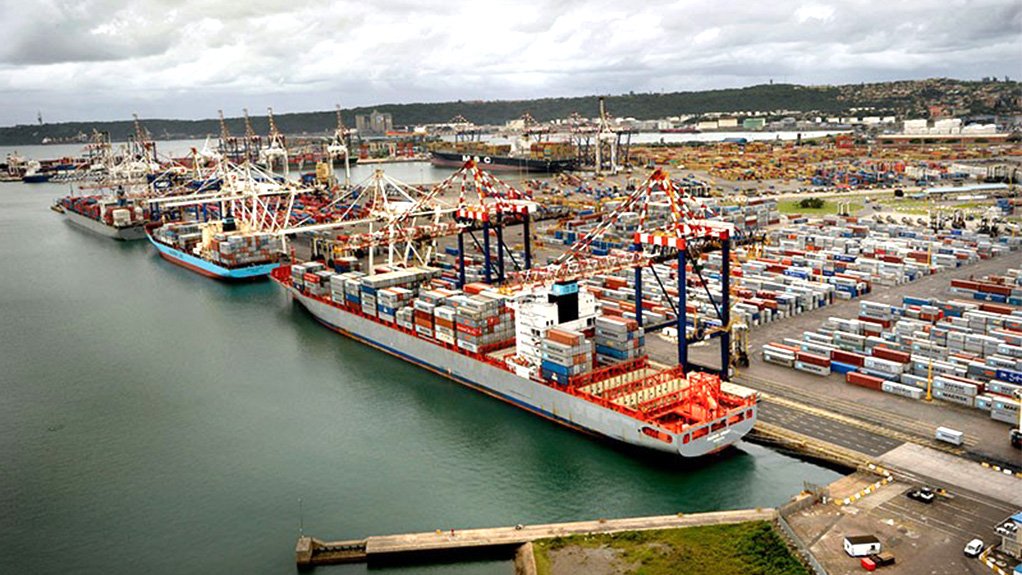There's been mixed reaction to Transnet Port Terminals' 25-year joint venture with Philippines-headquartered company International Container Terminal Services Inc for the development and upgrade of its biggest container terminal.
Transnet announced on Monday that it had concluded "the process of selecting an equity partner" for the joint venture and that International Container Terminal Services Inc was the preferred bidder. Durban Container Terminal (DCT) Pier 2 oversees 72% of the Durban port's throughput and 46% of South Africa's port traffic.
But, while African National Congress (ANC) KwaZulu-Natal secretary Bheki Mtolo came out to bat for the partnership, billed widely as a "partial privatisation" of the Durban port, unions have questioned it.
Mtolo said the deal was "long overdue" and that the partnership would stimulate exports and imports.
"This deal is long overdue, by the way, because the inaction at the port is costing huge money to the economy. The delays [in volume throughput] are costing the economy a lot," he said.
Mtolo said that the deal epitomised the ANC's mixed economy policy position.
"The ANC talks about a mixed economy. Parts of the economy should be in the hands of the State and parts of the economy in private hands."
He added it was "wrong to say the policy of the ANC is nationalisation" and said a distinction should be made between an operating entity's management of the port and privatisation.
"The port has not been sold. It's not true. They got somebody to operate the port - a management company. The port is a State-owned asset," he said.
Mtolo had recently returned from a study tour in China and, as an example, said the economy in that country was not entirely owned by the state.
He added that private companies in South Africa were even getting other companies to manage their distribution and other aspects of their businesses.
However, the labour industry holds different views.
In a statement, the SA Transport and Allied Workers Union (Satawu) said Transnet and Public Enterprises Minister Pravin Gordhan as "arrogant and selfish" and added that it was "sad to witness government selling State entities".
Speaking to News24, Cosatu parliamentary coordinator Matthew Parks said there was limited information about what the deal entailed but added that the union was "concerned".
He said it would engage with the government.
"We're not sure about bringing in foreign companies as if we don't have capacity here. We have capacity among workers at Transnet to fix issues," Parks said.
According to Transnet, the key elements of the transaction are the following:
- A new company will be formed to operate DCT Pier 2, where Transnet will have majority ownership of 50% plus one share.
- The term of the transaction is 25 years. There is an option to extend the agreement to a maximum of 30 years, in the event that berth deepening of the North Quay at Pier 2 is hamstrung by delays.
- Non-current assets will be transferred into the new company, along with customer and supplier contracts. The new entity will be required to achieve a minimum level 4 BBEE contribution status.
- The terminal operating licence and lease will be subcontracted to the new entity, following approval from the Transnet National Ports Authority.
- DCT Pier 2 employees will be seconded to the new entity, and there will be no retrenchments. Labour will retain the same terms and conditions. Transnet will start working with the Manila-headquartered company to "implement the transaction through the execution of the legal agreements, and ensuring compliance with all legal and regulatory matters".
North West University-based political analyst Professor André Duvenage's view was that the deal amounted to forced privatisation.
"There is no doubt that this is privatisation. This is a forced privatisation deal. This is an abdication of responsibility and authority.
"The government has come to the reality that they cannot manage the port and need additional support. We talk about the so-called public-private partnerships that are becoming part of the broader political scene."
In a statement, Transnet chief executive Portia Derby hailed the partnership as "a major step forward" in efforts to bring in global expertise to improve efficiencies at the company's terminals and added that it "bodes well for our ongoing plans to crowd in the private sector in areas identified for growth".
There were 18 responses to Transnet's initial call for request for interest in August 2021, it said.
EMAIL THIS ARTICLE SAVE THIS ARTICLE
To subscribe email subscriptions@creamermedia.co.za or click here
To advertise email advertising@creamermedia.co.za or click here











